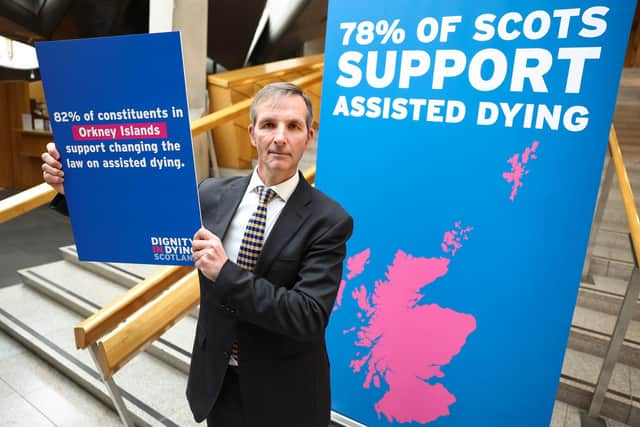Assisted dying bill must not fail because of wealthy and well-connected opponents
As a nation, we pride ourselves on our rich Enlightenment tradition of moral thinking: we uphold compassion, dignity and a deep-rooted respect for individual autonomy. Yet Scotland’s laws lag behind when it comes to the right of terminally ill individuals to choose the manner and timing of their own deaths. It is time to bring our legislation in line with the moral principles that define us as a society.
The case for assisted dying is clear and compelling. Imagine the agony of a terminally ill patient, trapped in a body wracked with pain, with no hope of recovery. Denying them the right to a dignified death – unless they have a spare £15,000 to travel to a Swiss clinic – is not merely a legal issue; it is a profound moral failure. Compassion demands that we offer people the autonomy to make their own end-of-life choices, free from unnecessary suffering.
Advertisement
Hide AdAdvertisement
Hide AdOpposition to assisted dying is often cloaked in ethical rhetoric: claiming to protect the vulnerable. This stance is disingenuous, driven by opponents’ personal beliefs. The campaign against assisted dying is bankrolled by people like Sir Brian Souter (who has poured in £100,000 over the past four years): the same factions that in the past spent lavishly to oppose gay rights and women’s bodily autonomy. Interestingly, Souter's charitable trust also paid £80,000 over the past four years to the Scottish Council on Human Bioethics, a campaigning organisation which is also against MSP Liam McArthur's bill on assisted dying.


Not a fringe belief
Opponents are entitled to their personal beliefs, but not to impose this authoritarian impulse on everyone. It is out of line with our shared principles. It is also out of line with what we know more than three-quarters of Scots – including Scots living with disabilities – believe is right. This is not a fringe belief, but a widespread conviction that respects personal autonomy and honours human dignity. We should trust individuals’ common sense when it comes to deciding what are the right end-of-life decisions for them. We should reject this attempt to meddle in private lives.
Evidence and experience give the lie to the arguments masking this authoritarian impulse. Safeguards can and will be put in place to protect the vulnerable, ensuring that the choice for assisted dying is made freely, with full consent, and only in tightly defined circumstances tailored specifically to Scottish needs. The claim that legalising assisted dying would lead to a slippery slope of devaluing life is a fear-mongering tactic that does not stand up to scrutiny.
Enduring values
In jurisdictions where assisted dying is legal, such as in parts of the United States and Europe, the evidence shows that these safeguards work effectively, and that palliative care is sustained and often expanded.
We must empower the terminally ill to make the decisions that are right for them in the face of unnecessary suffering and the prospect of a prolonged and painful death. It is time to recognise the common sense voices and views of individuals, and not give disproportionate weight to the wealthy and well-connected.
It is time for our laws to reflect our enduring values. Scotland must stand for compassion, dignity and the right to choose.
Professor Ben Colburn is a moral and political philosopher at the University of Glasgow
Comments
Want to join the conversation? Please or to comment on this article.
